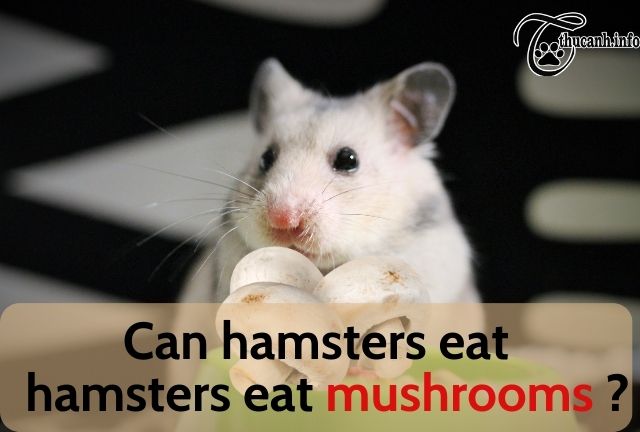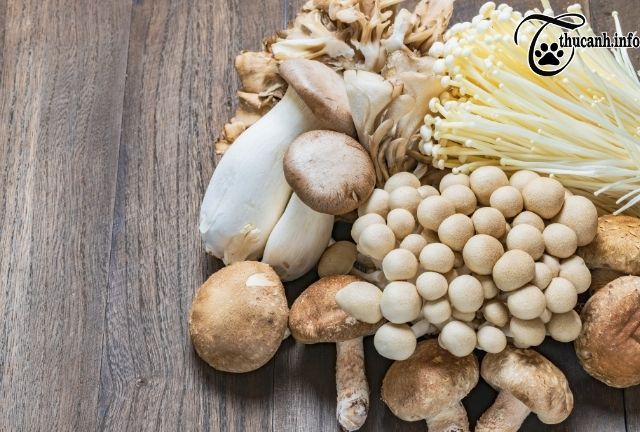Can Hamsters Eat Mushrooms? If you’re a hamster owner, you might wonder if mushrooms are a safe addition to your furry friend’s diet. While mushrooms offer various nutrients for humans, their impact on hamsters can be quite different. Uncover the truth about whether hamsters can eat mushrooms and the potential risks involved.
This informative guide will help you make well-informed decisions about your pet’s diet, ensuring their health and happiness. Let’s delve into the world of hamsters and mushrooms to provide the best care for your adorable companion.

Can hamsters eat mushrooms?
1. Can Hamsters Safely Consume Mushrooms?
As a pet expert with years of experience in caring for animals, I would advise against feeding mushrooms to hamsters. While some mushrooms may be safe for humans, they can pose a risk to small animals like hamsters due to their unique digestive systems.
Certain types of mushrooms can be toxic and cause serious health issues for hamsters. It’s best to stick to a balanced diet of commercial hamster food and approved fresh fruits and vegetables to ensure your pet’s well-being. Always prioritize your hamster’s safety and consult with a veterinarian for any dietary concerns.
Hamsters are adorable little creatures with specific dietary needs. As a responsible pet owner, it’s essential to understand whether mushrooms can be a safe addition to their diet. While mushrooms offer numerous health benefits for humans, the same may not apply to hamsters. Let’s delve into this topic to determine if mushrooms are suitable for our furry friends.
1.1. Understanding the Natural Diet of Hamsters
In the wild, hamsters primarily consume seeds, grains, and vegetation. Their natural diet consists of a variety of foods rich in essential nutrients. As such, their digestive systems have adapted to process these specific types of food. Introducing new items like mushrooms to their diet requires careful consideration.
1.2, Nutritional Value of Mushrooms and Potential Benefits
Mushrooms are known for being a nutritious food source for humans, packed with vitamins, minerals, and antioxidants. However, when it comes to hamsters, the story is different. While certain types of mushrooms may contain trace nutrients beneficial to hamsters, their digestive systems might not be well-equipped to handle mushrooms.
1.3. Potential Risks and Health Considerations
Feeding mushrooms to hamsters carries potential risks. Some mushrooms can be toxic to hamsters, leading to various health issues. As responsible pet owners, it’s crucial to avoid feeding wild mushrooms or any unfamiliar types of mushrooms to your hamster. Even non-toxic mushrooms might upset their delicate digestive system, causing discomfort or other health problems.
2. Mushrooms in a Hamster’s Diet

Do hamsters eat mushrooms?
Mushrooms, a diverse and popular food choice for humans, might intrigue hamster owners as a potential addition to their pet’s diet. However, before introducing mushrooms, it’s essential to delve into the topic and consider the safety and nutritional aspects for our furry friends.
2.1. Introducing Mushrooms to a Hamster’s Diet
As hamsters have a specific dietary requirement, it’s crucial to introduce new foods gradually. When introducing mushrooms, start with a small portion to observe your hamster’s reaction. Mushrooms are not a natural part of their diet, so it might take time for them to adjust. Observe for any signs of discomfort or adverse reactions.
2.2. Recommended Portions and Frequency
Due to the unique digestive system of hamsters, moderation is key when offering mushrooms. While mushrooms can contain certain nutrients beneficial to hamsters, excessive consumption might lead to digestive issues. Offer mushrooms as an occasional treat rather than a regular part of their diet to maintain a balanced and healthy eating pattern.
2.3. Monitoring Hamster’s Health and Reactions
As responsible pet owners, it’s vital to closely monitor your hamster’s health after introducing mushrooms. If your hamster shows signs of discomfort, gastrointestinal problems, or any unusual behavior, immediately remove mushrooms from their diet and seek guidance from a veterinarian experienced in small animal care.
3. Safe Mushroom Varieties for Hamsters

Is mushrooms good for hamsters?
Not all mushrooms are safe for hamsters to consume. Before offering mushrooms, it’s essential to identify safe varieties that are non-toxic and hamster-friendly.
3.1. Identifying Safe Mushrooms for Hamsters
When selecting mushrooms for your hamster, stick to commercially available, non-toxic varieties. Common edible mushrooms like button mushrooms or cremini mushrooms are generally safe options. Avoid wild mushrooms or exotic varieties, as they might pose health risks.
3.2. Avoiding Toxic or Harmful Mushrooms
Some mushrooms are highly toxic to hamsters and should be strictly avoided. Toxic mushrooms can lead to severe health complications or even be fatal to your pet. Ensure you are familiar with different types of mushrooms to prevent accidental consumption of toxic varieties.
3.3. Cooking or Preparing Mushrooms for Hamsters
If you choose to offer mushrooms to your hamster, ensure they are thoroughly cooked and prepared. Raw mushrooms may be difficult for hamsters to digest and might lead to gastrointestinal issues. Cooking mushrooms can make them softer and more palatable for your furry friend.
In Thucanh conclusion, mushrooms can be a potential treat for hamsters if offered in moderation and with careful consideration of their safety and nutritional value. Always prioritize your hamster’s well-being and consult with a veterinarian if you have any doubts or concerns about adding mushrooms to their diet. By making informed choices, you can ensure that your hamster enjoys a varied and balanced diet while staying healthy and happy.
4. FAQ
4.1. Is it safe for hamsters to eat mushrooms?
Mushrooms are not a natural part of a hamster’s diet, and their digestive systems are different from ours. While some mushrooms might be safe for human consumption, not all varieties are suitable for hamsters. It’s crucial to approach this with caution and avoid feeding wild mushrooms, as they can be toxic and harmful to hamsters. Always opt for commercially available, safe varieties if you decide to introduce mushrooms to your pet’s diet.
4.2. Can I feed my hamster wild mushrooms?
Feeding wild mushrooms to hamsters is strongly discouraged. Wild mushrooms are abundant in nature, but they can be toxic and pose significant health risks to hamsters. To ensure the safety of your pet, only provide commercially available, edible mushrooms that are known to be safe for hamsters.
4.3. How should I prepare mushrooms for my hamster?
If you choose to offer mushrooms to your hamster, it’s essential to prepare them properly. Firstly, make sure you choose safe varieties that are non-toxic and suitable for hamsters. Wash the mushrooms thoroughly to remove any dirt or contaminants. Secondly, cook the mushrooms thoroughly before serving them to your hamster. Cooking softens the mushrooms and makes them easier for hamsters to digest.
4.4. What are the potential risks of feeding mushrooms to hamsters?
Feeding mushrooms to hamsters comes with certain risks. Some mushrooms are toxic and can cause severe health issues, including gastrointestinal problems, organ failure, or even death. Additionally, mushrooms might be challenging for hamsters to digest due to their high fiber content. Overfeeding mushrooms can lead to digestive upset and other health complications. Always offer mushrooms as an occasional treat and in small portions to minimize any potential risks.
4.5. Can mushrooms be used as a treat for hamsters?
While mushrooms can contain some nutrients beneficial to hamsters, they should be considered an occasional treat rather than a regular part of their diet. Treats should make up only a small percentage of a hamster’s overall diet to ensure they receive the necessary nutrients from their primary food sources. Always prioritize a balanced diet for your pet and consult with a veterinarian before introducing any new food items.
In Thu canh‘s conclusion, mushrooms should be approached with caution when considering them for your hamster’s diet. While some varieties might be safe in small amounts, it’s essential to avoid wild mushrooms and prioritize safe, commercially available options.
As with any new food, carefully observe your hamster’s reaction and consult with a veterinarian if you have any concerns about feeding mushrooms to your furry friend.


